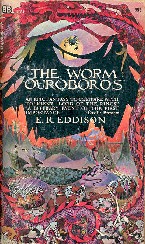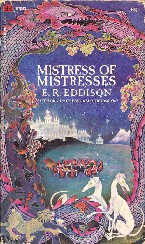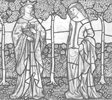E. R. Eddison
The clearest forerunner of Tolkien, who recognized his cracked literary genius but disliked the man intensely.
Although William Morris was the first to invent a completely made-up medieval fantasy world, and Dunsany was the first to populate these worlds with gods, monsters, and mountains of made-up proper nouns, it was the profoundly scholarly Eddison who brought to the genre detailed geographies, complex historical back-stories, epic violence, and an obsession with linguistics - Eddison actually expects you understand his numerous Latin and Greek quotes, not to mention his shockingly impenetrable Shakespearean English.
Put this all together, and Tolkien's work seems like an incremental (if utterly brilliant) step forward.
It's possible that Eddison was a little influenced by earlier pulp fiction writers, and in particular his Lessingham character resembles Burrough's John Carter.
But basically, he's completely unique.
Eddison was a slow writer, so in addition to the two books reviewed here, there are just two more, all set in the same fantasy world: 1938's A Fish Dinner In Memison, and The Mezentian Gate, which was released in an unfinished state (many of the chapters are just summaries) in 1945.
Interestingly, the entire sequence of novels was written in backwards chronological order, so each one is a prequel to the last.
I tried to tackle Memison and simply gave up - Wilson didn't even get through Mistress Of Mistresses - because by that point Eddison's writing had been overwhelmed by his bizarre, longwinded philosophical musings.
Eddison also produced a novel based on Norse mythology called Styrbiorn The Strong (1926), and a translation of the Icelandic Egil's Saga (1930).
Styrbiorn has never been reprinted and originals are very expensive, so there's no chance I'll review it. (JA)
|
The Worm Ouroboros (1926)
 - God-like heroes, lovingly depicted battles, vast landscapes, deathly visions, terrifying monsters, whiplash-inducing plot twists, epic quests, gaudy palace decor, naval battles, fierce little kingdoms with misleadingly monstrous names, vertigo-inducing mountain climbing, a bizarre plot resolution, even some discreet sex - E. R. Eddison throws everything imaginable at the reader.
Actually, he throws everything almost unintelligible at the reader, because he's a hard-core Elizabethan scholar, so he lards the text with some of the most difficult Shakespearean English you could possibly imagine.
I literally had to read this can't-put-it-down 500 page book with a dictionary in one hand, looking up as many as a dozen words per page.
But hey, it's educational!
No pain, no gain, right?
The war-loving Demons aren't the most sympathetic good guys in the world, but talk about villanous villains: the Witches are as bad as bad gets, complete with a fascinatingly treacherous key player.
Eddison was unquestionably an imperialistic, sexist, racist he-man, with none of Tolkien's common touch - he was practically a proto-Nazi, and it's no coincidence the humanistic Tolkien knew but despised the man.
But if you're going to go anywhere back before Tolkien, I think this is the place to start, as I did. (JA) - God-like heroes, lovingly depicted battles, vast landscapes, deathly visions, terrifying monsters, whiplash-inducing plot twists, epic quests, gaudy palace decor, naval battles, fierce little kingdoms with misleadingly monstrous names, vertigo-inducing mountain climbing, a bizarre plot resolution, even some discreet sex - E. R. Eddison throws everything imaginable at the reader.
Actually, he throws everything almost unintelligible at the reader, because he's a hard-core Elizabethan scholar, so he lards the text with some of the most difficult Shakespearean English you could possibly imagine.
I literally had to read this can't-put-it-down 500 page book with a dictionary in one hand, looking up as many as a dozen words per page.
But hey, it's educational!
No pain, no gain, right?
The war-loving Demons aren't the most sympathetic good guys in the world, but talk about villanous villains: the Witches are as bad as bad gets, complete with a fascinatingly treacherous key player.
Eddison was unquestionably an imperialistic, sexist, racist he-man, with none of Tolkien's common touch - he was practically a proto-Nazi, and it's no coincidence the humanistic Tolkien knew but despised the man.
But if you're going to go anywhere back before Tolkien, I think this is the place to start, as I did. (JA)
 - One of a very few books (with Tristram Shandy and the Bill James Baseball Abstracts) I re-read regularly. It starts slow, with practically pornographic descriptions of the enormous glistening jewels adorning the Demons' throne room as some loser named Lessingham asks dumb questions, but once it gets going you're immersed in a world of wondrous extremes, where you can count on nothing ordinary happening. Brandoch Daha is a paradoxically foppish hero, Lord Gro is one of literature's great villains, and the minor figures like Lady Sriva are whisked offstage while there's still some mystery to them. "'Tis writ somewhat crabbedly," no doubt, and Eddison's bloodlust may be hard to stomach, but if you can hang in with it, the book's rewards are incomparable.
(DBW) - One of a very few books (with Tristram Shandy and the Bill James Baseball Abstracts) I re-read regularly. It starts slow, with practically pornographic descriptions of the enormous glistening jewels adorning the Demons' throne room as some loser named Lessingham asks dumb questions, but once it gets going you're immersed in a world of wondrous extremes, where you can count on nothing ordinary happening. Brandoch Daha is a paradoxically foppish hero, Lord Gro is one of literature's great villains, and the minor figures like Lady Sriva are whisked offstage while there's still some mystery to them. "'Tis writ somewhat crabbedly," no doubt, and Eddison's bloodlust may be hard to stomach, but if you can hang in with it, the book's rewards are incomparable.
(DBW)
|

|
|
|
 Mistress Of Mistresses (1935) Mistress Of Mistresses (1935)
Weighed down by interminable philosophical/poetic mumbo jumbo whenever one of Eddison's quasi-divine female characters shows up, light on magic and monsters, and heavy on the palace intrigue, this is still strikingly if sporadically entertaining.
Eddison has invented a new fantasy land to the south of the Ouroboros milieu, and it's more geographically coherent, with a more linear and plausible plotline, an unimpeachable hero, fewer but equally effective battle scenes, and thankfully, some less impenetrable if still extremely archaic vocabulary.
Some of the characterization is strong and the dialogue witty, Eddison ladles out some of his elaborate scenery, and with all the shifting alliances and crowds of selfish characters, he creates an interesting plot device of not making it clear which side is "good" and which "bad" until half way through the book.
Despite a disappointingly abrupt ending, the book is still a good distraction if you can somehow plow through the ranting, raving romantic interludes. (JA)
Every time I read Ouroboros, I say to myself, "This time I'm going to get through Mistress, and then on to A Fish Dinner In Memison!" I even bought the book a second time in paperback so I wouldn't have to carry around the huge Zimiamvia volume that contains those books plus the unfinished The Mezentian Gate. But it's so unbelievably talky and dull I just can't read the damned thing. (DBW)
|

|
|
|

